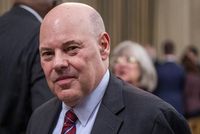Postmaster General Louis DeJoy announced his resignation from the U.S. Postal Service (USPS) on March 24, 2025, effective immediately. Having served as the 75th Postmaster General, DeJoy's departure comes amid mounting speculation surrounding the potential privatization of the 250-year-old agency, a subject that has sparked political debate and concern.
In a statement issued regarding his resignation, DeJoy noted, "After nearly five years as America's 75th Postmaster General, and after informing the Governors in February of my intention to retire, I have informed the Postal Service Board of Governors that today will be my last day in this role." He expressed pride in his tenure while acknowledging the challenges that lie ahead, stating, "It has been one of the pleasures of my life and a crowning achievement of my career to have been associated with this cherished institution." DeJoy has been a controversial figure since his appointment during former President Donald Trump's tenure, often facing criticism over management decisions and cuts to service.
The timing of DeJoy's resignation aligns with discussions about the future of USPS amidst a tumultuous financial situation. In 2021, he articulated the gravity of the agency's challenges, describing USPS as being in a "death spiral," losing approximately $10 billion annually. In fact, he reported that the organization had accumulated close to $100 billion in losses over previous decades and was projected to lose another $200 billion in the ensuing years. DeJoy reiterated that fixing such an ailing organization would be no small feat.
Deputy Postmaster General Doug Tulino has been appointed to take over on an interim basis while the Governors search for a permanent successor. The transition comes at a critical juncture as the agency faces ongoing scrutiny regarding its business model and operational efficiency. Tulino's leadership will be pivotal in ensuring continued postal service during this period of uncertainty.
The political atmosphere surrounding USPS is charged with calls for major changes. Former President Trump signaled potential restructuring when he mentioned a merger involving Commerce Secretary Howard Lutnick, emphasizing, "We want to have a post office that works well and doesn't lose massive amounts of money." Trump’s remarks at Lutnick’s swearing-in implied future plans that involve altering the very nature of the Postal Service.
Earlier this month, high-profile figures like Elon Musk and government advisers discussed privatization as a viable option for the struggling service. Musk and the Department of Government Efficiency suggested that USPS is a prime candidate for privatization, leading to increased concern regarding the future direction of a service that historically has been a backbone of American communication and logistics.
Amid these transitions, DeJoy confirmed the difficult decision to initiate a voluntary early retirement program that would result in the loss of approximately 10,000 USPS jobs. This move exemplified the drastic measures being considered to turn around the ailing institution.
In response to DeJoy's resignation, the American Postal Workers Union (APWU) issued a statement labeling his departure as a consequence of political pressures. APWU President Mark Dimondstein charged, "Make no mistake, the postmaster general was forced out by a White House intent on breaking up and selling off the public U.S. Postal Service." He asserted that the union would continue fighting to maintain the USPS as a public service, stating, "Our union will continue to lead the fight to ensure that the USPS stays in the hands of its rightful owners—the people—and that it continues to provide quality, universal service that the public both relies on and deserves."
As DeJoy hands over the reins, he leaves behind a mixed legacy of reforms and unrest within the USPS. While he highlighted achievements within the USPS, including improvements in service delivery and financial sustainability, he also recognized that much work remains necessary to shift the agency’s trajectory towards positive long-term performance.
The future of the U.S. Postal Service hangs in the balance as it faces a complex intersection of operational challenges and political maneuvering. As discussions around privatization intensify and the search for a new permanent leader begins, the agency's ability to serve the public consistent with its core mission may depend on the decisions made in the coming months. The question remains: Can the beleaguered USPS navigate this tumultuous chapter and emerge as an efficient service provider that meets the demands of the modern world, or will it be transformed into a privatized entity that alters the landscape of mail delivery as we know it?




